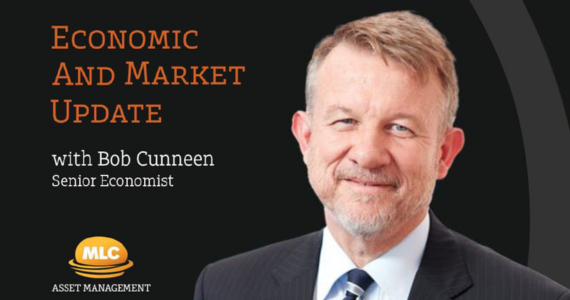Key events in January 2025
- Global shares made strong gains in January. Notably Australian, European and US shares made historic highs. Optimism on President Trump’s agenda for lower taxes and less regulation combined with hopes for lower interest rates in Australia and Europe were the key positive drivers.
- However, this enthusiasm was dented by President Trump’s announcement on 31 January of higher tariffs for China, Canada and Mexico. News that a Chinese technology firm “Deep Seek” had developed a cheaper Artificial Intelligence (AI) process also dented semi-conductor stocks such as Nvidia.
- European shares made strong gains with the central bank cutting interest rates again by 0.25% in January.
- Chinese shares made only modest gains. Concerns over China’s weak property sector and the new US President’s trade and tariff agenda remain prominent risks. Japanese shares were flat with the central bank raising interest rates by 0.25% in January given that inflation is well above their 2% target.
- Australian shares made strong gains primarily on the prospect for lower interest rates. The strongest gains were in the Consumer Discretionary, Financials and Real Estate sectors with hopes that the Reserve Bank of Australia (RBA) should be contemplating cutting cash interest rates at the next meeting in February. There were also sharp gains across most other industry sectors with the notable disappointment being Utilities.
- Australia’s Consumer Price Index (CPI) showed further progress towards lower inflation in the December quarter. Headline CPI annual inflation came in at 2.4% with the benefit of government electricity rebates and lower fuel prices. With underlying inflation as measured by the Trimmed Mean1 also showing a moderation in annual inflation to 3.2%, this is perceived as opening the door for the RBA to lower interest rates in February. Australia’s economic activity data shows more resilience with strong jobs growth and a low unemployment rate of 4% recorded in December.
Asset class summary
Asset class returns in Australian dollars – periods to 31 January 2025
|
|
CYTD % | 1 month
% |
3 months
% |
1 year
% |
3 years pa % |
5 years pa % |
10 years pa % |
|
Australian shares |
4.5 | 4.5 | 5.0 | 15.1 | 11.1 | 7.9 |
8.6 |
|
Global shares (hedged) |
3.3 | 3.3 | 5.7 | 22.0 | 8.5 | 10.4 |
9.9 |
|
Global shares (unhedged) |
2.6 | 2.6 | 9.9 | 27.9 | 12.9 | 12.6 |
12.2 |
|
Emerging markets (unhedged) |
1.0 | 1.0 | 2.9 | 21.6 | 3.4 | 4.5 |
6.1 |
|
Australian property securities |
4.6 | 4.6 | 0.8 | 21.5 | 8.3 | 5.7 |
8.3 |
|
Global property securities (hedged) |
1.6 | 1.6 | -2.4 | 8.1 | -3.3 | -1.3 |
2.2 |
|
Global listed infrastructure (hedged) |
0.7 | 0.7 | -1.4 | 14.9 | 3.3 | 2.4 |
5.6 |
|
Australian bonds |
0.2 | 0.2 | 1.8 | 2.9 | -0.4 | -0.6 |
1.8 |
|
Global bonds (hedged) |
0.4 | 0.4 | 0.7 | 2.9 | -1.2 | -0.7 |
1.7 |
|
Global high yield bonds (hedged) |
1.3 | 1.3 | 1.8 | 6.9 | 2.3 | 2.8 |
4.5 |
|
Australian inflation-linked bonds |
0.3 | 0.3 | 1.3 | 2.7 | 2.2 | 2.0 |
2.6 |
|
Cash |
0.4 | 0.4 | 1.1 | 4.5 | 3.3 | 2.0 |
2.0 |
|
AUD/USD |
0.7 | 0.7 | -4.8 | -5.6 | -4.0 | -1.4 |
-2.2 |
Past performance is not a reliable indicator of future performance. Sources: Australian shares – S&P/ASX 300 Total Return Index; Global shares (hedged) – MSCI All Countries World (A$ hedged, Net); Global shares (unhedged) – MSCI All Countries World in A$ (Net); Emerging markets – MSCI Emerging Markets in A$ (Net); Australian property securities – S&P/ASX 300 A-REIT Accumulation Index; Global property securities – FTSE EPRA/NAREIT Developed (A$ hedged, Net); Global listed infrastructure – FTSE Global Core Infrastructure 50/50 (Hedged $A); Australian bonds – Bloomberg AusBond Composite 0+ Yr Index; Global bonds (A$ hedged) – Barclays Global Aggregate (A$ hedged, Gross); Global high yield bonds (A$ hedged) – Barclays US High Yield Ba/B Cash Pay x Financials ($A Hedged); Australian inflation-linked bonds – Bloomberg AusBond Inflation Government 0+ Yr Index; Cash – Bloomberg AusBond Bank Bill Index; AUD/USD – WM/Reuters Daily (4 pm GMT). 1 Trimmed Mean is the average rate of inflation after ‘trimming’ away the items with the largest price changes (positive or negative). It is the weighted average of the middle 70 per cent of items. Source: ‘Inflation and its Measurement’, Reserve Bank of Australia Education.
Key events in global markets over the last three months to January 2025
Global shares (hedged) posted a very strong 5.7% return over the quarter with optimism over AI potential and President Trump’s agenda for lower taxes and less regulation. Global shares (unhedged) recorded an exceptionally strong 9.9% return given the sharp decline in the Australian dollar.
Wall Street’s benchmark S&P 500 Index made historic highs and delivered a 6.1% quarterly return in local currency terms. The exuberant optimism on technology shares is the key tailwind behind Wall Street’s ascent. The US central bank has also been a supportive cheerleader by lowering interest rates given falling inflation.
European shares also delivered strong returns with the European Central Bank (ECB) cutting interest rates.
Asian share markets delivered mixed performances. Chinese shares delivered a flat return over the past three months after an extraordinary recovery in September. Investors have once again become cautious about China’s prospects given the struggling property market. However, Japanese share markets have made solid gains even with the Japanese central bank raising interest rates in recent months.
Global bonds (hedged) delivered a modest 0.7% quarterly return. While lower interest rate settings in Europe and the US are positives, investors have taken a more cautious outlook on inflation prospects. Australian bonds delivered a solid 1.8% return given that recent lower inflation results provide some optimism that the RBA will be contemplating cutting interest rates in 2025.
Key events in Australia over the last three months to January 2025
Australian shares delivered a very strong quarterly return of 5.0%. There was notable strength in the Industrial (9.5%) and Financial (8.8%) sectors given hopes for lower interest rates. The Information Technology sector also posted very strong returns (8.7%) given the promise of all things AI. However the Resources sector disappointed with a -3.0% return as worries over China’s growth prospects have softened commodity prices.
Australia’s economy continued to display subdued economic activity. The negative impact of high consumer prices, mortgage interest rates and rents continued to squeeze budgets. Yet there has been some more encouraging news in terms of solid jobs growth and milder inflation. Australia’s annual inflation rate declined to 2.4% in the year to December 2024. This moderation in price rises reflects the benefit of government electricity subsidies. According to the Australian Bureau of Statistics, “Electricity prices fell 9.9 per cent in the December quarter and 25.2 per cent in the past 12 months”2. Given the “softer than expected” Australian economic activity and milder inflation results, the RBA appears more open to cutting interest rates in 2025 judging by their most recent commentary at the December 2024 meeting.
Global prospects
Global share prices have made very strong gains in the past two years despite some considerable challenges. The enthusiasm for AI and technology were the key factors supporting global rising share prices. There was also confidence that with inflation gradually falling across the world, central banks would make further cuts to interest rates. A lower interest rate environment should be more supportive of corporate profits and thereby share prices in the long run.
However, these exuberant expectations may be challenged by considerable global political risks in 2025 with the continuing Russian-Ukraine war and conflict in the Middle East. The return of Donald Trump to the White House could also generate concerns for the global economy with the potential imposition of large tariff increases for America’s trading partners (particularly China and Europe) as well as the threatened deportation of illegal immigrants.
Given these complex and significant risks, investors should maintain a disciplined and diversified strategy.
2 Australian Bureau of Statistics, 29/01/2025, https://www.abs.gov.au/statistics/economy/price-indexes-and-inflation/consumer-price-index-australia/latest-release
Important information This communication is provided by MLC Investments Limited (ABN 30 002 641 661, AFSL 230705) (MLC), part of the Insignia Financial Group of companies (comprising Insignia Financial Ltd, ABN 49 100 103 722 and its related bodies corporate) (‘Insignia Financial Group’). An investment with MLC does not represent a deposit or liability of, and is not guaranteed by, the Insignia Financial Group. This information may constitute general advice. It has been prepared without taking account of an investor’s objectives, financial situation or needs and because of that an investor should, before acting on the advice, consider the appropriateness of the advice having regard to their personal objectives, financial situation and needs. Past performance is not a reliable indicator of future performance. Share market returns are all in local currency. Any opinions expressed in this communication constitute our judgement at the time of issue and are subject to change. We believe that the information contained in this communication is correct and that any estimates, opinions, conclusions or recommendations are held or made as at the time of compilation. However, no warranty is made as to their accuracy or reliability (which may change without notice), or other information contained in this communication. This information is directed to and prepared for Australian residents only. MLC may use the services of any member of the Insignia Financial Group where it makes good business sense to do so and will benefit customers. Amounts paid for these services are always negotiated on an arm’s length basis. MLC relies on third parties to provide certain information and is not responsible for its accuracy, nor is MLC liable for any loss arising from a person relying on information provided by third parties. Bloomberg Finance L.P. and its affiliates (collectively, “Bloomberg”) do not approve or endorse any information included in this material and disclaim all liability for any loss or damage of any kind arising out of the use of all or any part of this material. The funds referred to herein is not sponsored, endorsed, or promoted by MSCI, and MSCI bears no liability with respect to any such funds.


